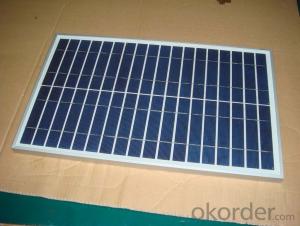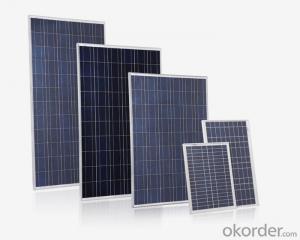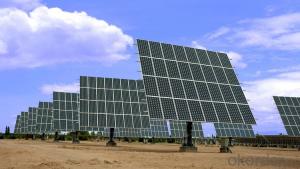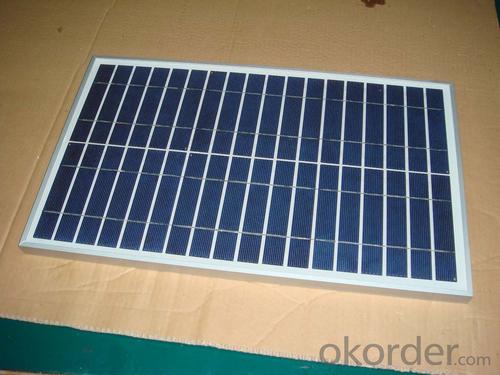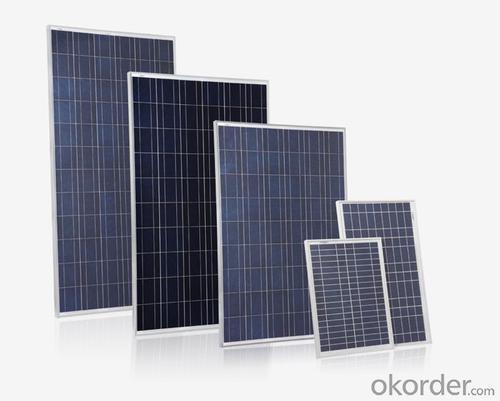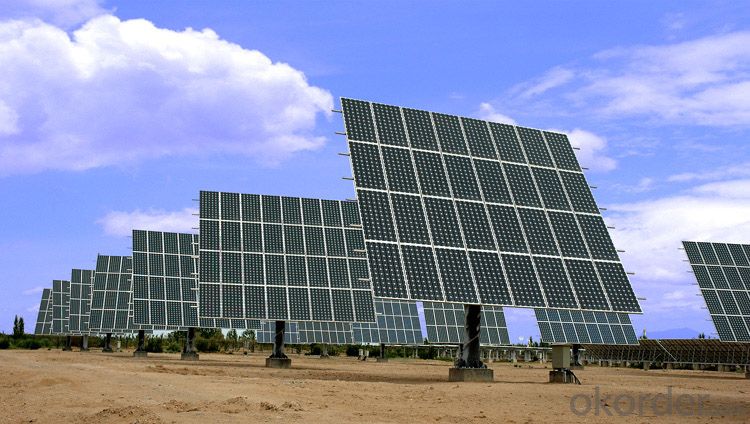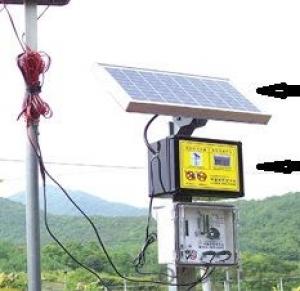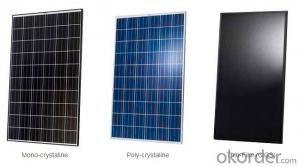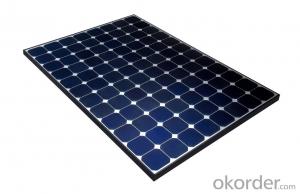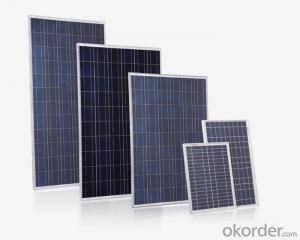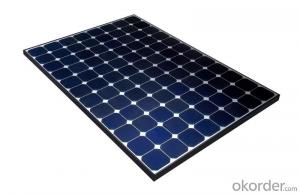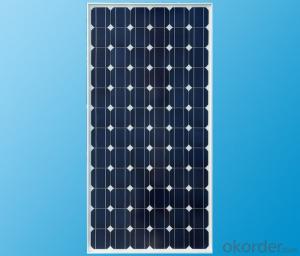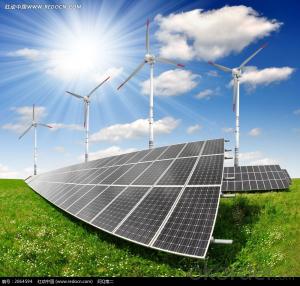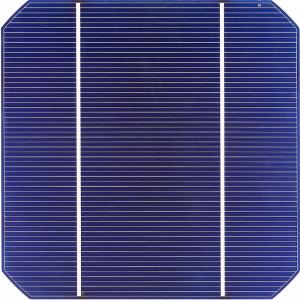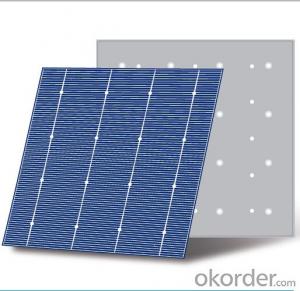Low Light Solar Cells - Favorites Compare High Quality 12V 100W Poly Solar Panel
- Loading Port:
- China Main Port
- Payment Terms:
- TT OR LC
- Min Order Qty:
- -
- Supply Capability:
- 10000000000000 watt/month
OKorder Service Pledge
Quality Product, Order Online Tracking, Timely Delivery
OKorder Financial Service
Credit Rating, Credit Services, Credit Purchasing
You Might Also Like
Quick Details
| Place of Origin: | Guangdong China (Mainland) | Brand Name: | SunnyPower | Model Number: | SPM |
| Specification: | Normal | Application: | Home | Output Voltage (V): | 12VDC 24V DC |
| Load Power (W): | Depands | Solar Power (W): | 5W--300W | Certification: | VDE,IEC,CSA,UL,CEC,MCS,CE,ISO,ROSH |
| Size: | Customized dimensions | Max power: | 5W---300W | Cable: | MC-4 and connector |
| Frame: | White or black aluminum | Glass: | Low iron tempered glass | Cell type: | Mono crystalline and Poly crystalline |
| Cell brand: | Taiwan Motech | System voltage: | 12v or 24v |
Packaging & Delivery
| Packaging Detail: | Each panel with one single caton,and then 10pcs/5pcs with one outer carton,finally use wooden pallets to pack the cartons. |
| Delivery Detail: | 20 days |
Specifications
solar panels from 5W--300W, made of TAIWAN MOTECH brand cells,with CO in TAIWAN,Mono and Poly with VDE,IEC,CSA,UL,CE,ISO.
We import solar cells from Taiwan Motech brand, with this CO in taiwan and our CSA certification,we can still sell goods to Anti-dumping areas like USA. Our main products are solar panels, off grid and on grid solar home systems , solar street lighting systems, solar water heating system,solar pump,solar attic fan, solar DC LED lights and solar DC refrigerators.
Certificates : ISO, CE, VDE IEC, MCS, CSA-UL, CEC.
Delivery time: sample 10days, order 25-30days.
Sample: charged.
Payment term: T/T 30% as deposit, 70% before shipment. Or irrevocable L/C at sight.
Trade term: FOB Shenzhen or CIF destination seaport or Airport.
Delivery time: sample 10days, order 25-30days.
Sample: charged.
Payment term: T/T 30% as deposit, 70% before shipment. Or irrevocable L/C at sight.
Trade term: FOB Shenzhen or CIF destination seaport or Airport.
- Q: Can solar cells be used on windows?
- Yes, solar cells can be used on windows. Photovoltaic (PV) technology allows solar cells to be integrated into windows, transforming them into transparent solar panels. These solar windows can generate electricity from sunlight while still maintaining the functionality of a regular window. They are being increasingly used in buildings to harness solar energy and contribute to sustainable energy solutions.
- Q: Where can I buy the 156x156mm high efficiency poly solar cells assembly?
- 156x156mm high efficiency poly solar cells assembly is usually very easy to get, all you need to do is to post your need online, and the suppliers will come to you.
- Q: What are the advantages of using solar cells?
- One of the main advantages of using solar cells is that they harness renewable energy from the sun, which is an abundant and sustainable resource. Solar cells are environmentally friendly as they produce clean energy, emitting no greenhouse gases or pollutants. They also provide energy independence, reducing reliance on fossil fuels and decreasing energy costs over time. Solar cells require minimal maintenance and have a long lifespan, making them a cost-effective option in the long run. Additionally, they can be installed in remote areas where it may be challenging to access traditional electricity grids, providing electricity to communities that otherwise would not have access.
- Q: Can solar cells be used in combination with batteries?
- Yes, solar cells can indeed be used in combination with batteries. In fact, this combination is quite common in solar power systems. Solar cells generate electricity from sunlight, which can be stored in batteries for later use when the sun is not shining, such as during the night or on cloudy days. This helps provide a continuous and reliable power supply, making solar energy more practical and efficient.
- Q: How do solar cells affect air pollution?
- Solar cells reduce air pollution by generating electricity from the sun's energy without burning fossil fuels, thereby eliminating harmful emissions such as carbon dioxide, sulfur dioxide, and nitrogen oxides that contribute to air pollution.
- Q: Can solar cells be used for desalination?
- Yes, solar cells can be used for desalination. Solar energy can be harnessed to power the desalination process, making it a sustainable and environmentally friendly option for producing fresh water from seawater.
- Q: Can solar cells be used in residential applications?
- Yes, solar cells can be used in residential applications. They are commonly used to generate electricity for homes, providing a clean and renewable energy source. Solar panels are installed on rooftops or in yards, capturing sunlight and converting it into usable electricity for various household needs. This helps reduce reliance on traditional power grids and lowers carbon emissions, making it an environmentally friendly and cost-effective solution for residential energy needs.
- Q: What are the main components of a solar cell?
- The main components of a solar cell are a semiconductor material, typically silicon, which absorbs sunlight and generates electricity; metal contacts that collect and carry the generated electricity; and a protective layer, usually made of glass or plastic, to shield the semiconductor material from external factors.
- Q: Can solar cells be used in remote areas without access to the grid?
- Yes, solar cells can be used in remote areas without access to the grid. Solar cells, also known as photovoltaic cells, generate electricity from sunlight. They can be installed in remote areas to harness the sun's energy and provide power for various applications such as lighting, water pumping, and charging electronic devices. Solar cells are particularly suitable for off-grid locations as they operate independently of the traditional electric grid, making them a reliable and sustainable solution for remote areas.
- Q: What is the impact of dust or dirt on solar cell performance?
- The presence of dust or dirt on solar cells can have a significant impact on their performance. It can reduce the amount of sunlight reaching the cells, thereby decreasing their efficiency in converting sunlight into electricity. The accumulation of dust or dirt can create a barrier between the sunlight and the cells, preventing the photons from effectively interacting with the semiconductor material. This can result in a decrease in power output and overall energy generation. Regular cleaning and maintenance of solar panels are essential to ensure optimal performance and maximize energy production.
Send your message to us
Low Light Solar Cells - Favorites Compare High Quality 12V 100W Poly Solar Panel
- Loading Port:
- China Main Port
- Payment Terms:
- TT OR LC
- Min Order Qty:
- -
- Supply Capability:
- 10000000000000 watt/month
OKorder Service Pledge
Quality Product, Order Online Tracking, Timely Delivery
OKorder Financial Service
Credit Rating, Credit Services, Credit Purchasing
Similar products
Hot products
Hot Searches
Related keywords
